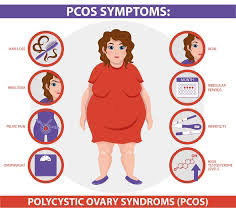Understanding Polycystic Ovary Syndrome (PCOS): Causes, Symptoms, and Management
Introduction:
Polycystic Ovary Syndrome (PCOS) is a common hormonal disorder affecting women of reproductive age. It is characterized by a combination of symptoms that can have a significant impact on a woman's physical and emotional well-being. This article aims to provide a comprehensive overview of PCOS, including its causes, symptoms, and management strategies.
I. Understanding PCOS:
A. Definition:
Polycystic Ovary Syndrome is a hormonal disorder that affects the ovaries, leading to an imbalance of reproductive hormones.
B. Causes:
Hormonal Imbalance: PCOS is often associated with higher levels of androgens (male hormones) in women, which can disrupt the normal functioning of the ovaries.
Insulin Resistance: Insulin resistance, a condition in which cells fail to respond to insulin properly, is frequently observed in women with PCOS. This can lead to elevated insulin levels and further hormone imbalances.
II. Symptoms of PCOS:
A. Menstrual Irregularities: Women with PCOS often experience irregular periods or may have prolonged or heavy menstrual bleeding.
B. Hyperandrogenism: Excessive androgen production can result in symptoms such as hirsutism (excessive hair growth), acne, and male-pattern baldness.
C. Polycystic Ovaries: The ovaries may develop small cysts, which are actually follicles that fail to mature and release an egg during the menstrual cycle.
D. Metabolic Issues: PCOS is associated with an increased risk of developing metabolic disorders, including insulin resistance, obesity, type 2 diabetes, and high cholesterol levels.
III. Diagnosis:
A. Medical History and Physical Examination: A doctor will evaluate symptoms, menstrual patterns, and perform a physical examination to check for signs of PCOS.
B. Hormonal Testing: Blood tests are conducted to measure hormone levels, including androgens, insulin, and luteinizing hormone (LH).
C. Pelvic Ultrasound: An ultrasound examination of the ovaries can reveal the presence of cysts and assess their size and number.
IV. Management and Treatment:
A. Lifestyle Modifications: Implementing a healthy lifestyle, including regular exercise, a balanced diet, and weight management, can help improve symptoms and reduce the risk of associated complications.
B. Medications:
Hormonal Birth Control: Oral contraceptives can regulate menstrual cycles and reduce androgen levels.
Anti-androgen Medications: These medications block the effects of androgens, helping to alleviate symptoms such as hirsutism and acne.
Insulin-sensitizing Agents: Medications like metformin can improve insulin resistance and assist in regulating menstrual cycles.
C. Fertility Treatment: For women planning to conceive, fertility medications or assisted reproductive techniques may be recommended.
D. Psychological Support: PCOS can have a significant emotional impact. Support from healthcare professionals, counselors, or support groups can be beneficial in managing the emotional aspects of the condition.
Conclusion:
Polycystic Ovary Syndrome (PCOS) is a complex hormonal disorder that affects many women worldwide. Understanding its causes, recognizing its symptoms, and adopting appropriate management strategies are crucial in mitigating the impact of PCOS on a woman's health and well-being. By implementing lifestyle modifications, utilizing medications, and seeking professional support, women with PCOS can effectively manage their symptoms and lead fulfilling lives.
Disclaimer: This article is for informational purposes only and should not replace medical advice. Always consult a healthcare professional for accurate diagnosis and personalized treatment.





Post a Comment